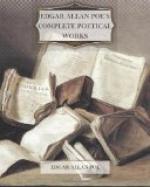With as deep a reverence for the True as ever inspired the bosom of man, I would nevertheless limit, in some measure, its modes of inculcation. I would limit to enforce them. I would not enfeeble them by dissipation. The demands of Truth are severe. She has no sympathy with the myrtles. All that which is so indispensable in Song is precisely all that with which she has nothing whatever to do. It is but making her a flaunting paradox to wreathe her in gems and flowers. In enforcing a truth we need severity rather than efflorescence of language. We must be simple, precise, terse. We must be cool, calm, unimpassioned. In a word, we must be in that mood which, as nearly as possible, is the exact converse of the poetical. He must be blind indeed who does not perceive the radical and chasmal difference between the truthful and the poetical modes of inculcation. He must be theory-mad beyond redemption who, in spite of these differences, shall still persist in attempting to reconcile the obstinate oils and waters of Poetry and Truth.
Dividing the world of mind into its three most immediately obvious distinctions, we have the Pure Intellect, Taste, and the Moral Sense. I place Taste in the middle because it is just this position which in the mind it occupies. It holds intimate relations with either extreme; but from the Moral Sense is separated by so faint a difference that Aristotle has not hesitated to place some of its operations among the virtues themselves. Nevertheless we find the offices of the trio marked with a sufficient distinction. Just as the Intellect concerns itself with Truth, so Taste informs us of the Beautiful, while the Moral Sense is regardful of Duty. Of this latter, while Conscience teaches the obligation, and Reason the expediency, Taste contents herself with displaying the charms, waging war upon Vice solely on the ground of her deformity, her disproportion, her animosity to the fitting, to the appropriate, to the harmonious, in a word, to Beauty.




